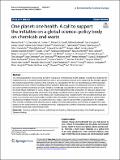Por favor, use este identificador para citar o enlazar a este item:
http://hdl.handle.net/10261/266909COMPARTIR / EXPORTAR:
 SHARE SHARE
 CORE
BASE CORE
BASE
|
|
| Visualizar otros formatos: MARC | Dublin Core | RDF | ORE | MODS | METS | DIDL | DATACITE | |

| Título: | One planet: one health. A call to support the initiative on a global science-policy body on chemicals and waste |
Autor: | Brack, Werner; Barceló, Damià CSIC ORCID; Boxall, Alistair B. A.; Budzinski, Hélène; Castiglioni, Sara; Covaci, Adrian; Dulio, Valeria; Escher, Beate Isabella; Fantke, Peter; Kandie, Faith; Fatta-Kassinos, Despo; Hernández, Félix J; Hilscherová, Klára; Hollender, Juliane; Hollert, Henner; Jahnke, Annika; Kasprzyk-Hordern, Barbara; Khan, Stuart J.; Kortenkamp, Andreas; Kümmerer, Klaus; Lalonde, Brice; Lamoree, Marja H.; Levi, Yves; Lara Martín, Pablo Antonio; Montagner, Cassiana Carolina; Mougin, Christian; Msagati, Titus; Oehlmann, Jörg; Posthuma, Leo; Reid, Malcolm; Reinhard, Martin; Richardson, Susan D.; Rostkowski, Pawel; Schymanski, Emma; Schneider, Flurina; Slobodnik, Jaroslav; Shibata, Yasuyuki; Snyder, Shane Allen; Fabriz Sodré, Fernando; Teodorovic, Ivana; Thomas, Kevin V.; Umbuzeiro, Gisela A.; Viet, Pham Hung; Yew-Hoong, Karina Gin; Zhang, Xiaowei; Zuccato, Ettore | Palabras clave: | Systems thinking Chemical pollution One-health perspective Planetary boundaries Science–policy body on chemicals |
Fecha de publicación: | 2022 | Editor: | Springer Nature | Citación: | Environmental Sciences Europe 34: 21 (2022) | Resumen: | The chemical pollution crisis severely threatens human and environmental health globally. To tackle this challenge the establishment of an overarching international science-policy body has recently been suggested. We strongly support this initiative based on the awareness that humanity has already likely left the safe operating space within planetary boundaries for novel entities including chemical pollution. Immediate action is essential and needs to be informed by sound scientific knowledge and data compiled and critically evaluated by an overarching science-policy interface body. Major challenges for such a body are (i) to foster global knowledge production on exposure, impacts and governance going beyond data-rich regions (e.g., Europe and North America), (ii) to cover the entirety of hazardous chemicals, mixtures and wastes, (iii) to follow a one-health perspective considering the risks posed by chemicals and waste on ecosystem and human health, and (iv) to strive for solution-oriented assessments based on systems thinking. Based on multiple evidence on urgent action on a global scale, we call scientists and practitioners to mobilize their scientific networks and to intensify science-policy interaction with national governments to support the negotiations on the establishment of an intergovernmental body based on scientific knowledge explaining the anticipated benefit for human and environmental health. | Versión del editor: | https://doi.org/10.1186/s12302-022-00602-6 | URI: | http://hdl.handle.net/10261/266909 | DOI: | 10.1186/s12302-022-00602-6 | ISSN: | 2190-4707 |
| Aparece en las colecciones: | (IDAEA) Artículos |
Ficheros en este ítem:
| Fichero | Descripción | Tamaño | Formato | |
|---|---|---|---|---|
| s12302-022-00602-6.pdf | Artículo principal | 1,03 MB | Adobe PDF |  Visualizar/Abrir |
CORE Recommender
PubMed Central
Citations
9
checked on 12-mar-2024
SCOPUSTM
Citations
41
checked on 24-abr-2024
WEB OF SCIENCETM
Citations
35
checked on 27-feb-2024
Page view(s)
56
checked on 27-abr-2024
Download(s)
38
checked on 27-abr-2024
Google ScholarTM
Check
Altmetric
Altmetric
Artículos relacionados:
NOTA: Los ítems de Digital.CSIC están protegidos por copyright, con todos los derechos reservados, a menos que se indique lo contrario.
